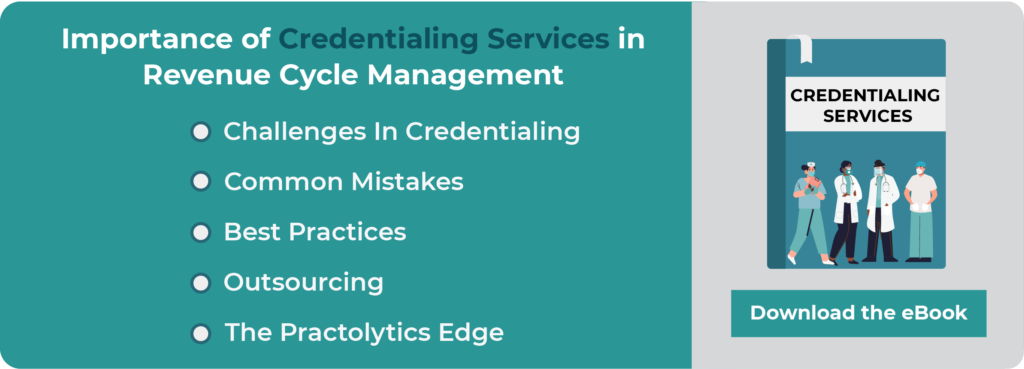Avoiding Credentialing Problems in Behavioral Health Providers
If there’s one process in healthcare that consistently tests the patience of providers and administrators, it’s credentialing. For behavioral health practices—especially fast-growing mental health clinics—the complexity only multiplies. Unlike primary care or other specialties, behavioral health operates at the intersection of multiple payer rules, evolving compliance requirements, and high patient demand.
At Practolytics, we’ve spent over two decades helping providers across 28+ specialties navigate these challenges. Behavioral health remains one of the most dynamic, and unfortunately, one of the most vulnerable when it comes to credentialing delays and denials. This blog dives deep into avoiding credentialing problems in behavioral health providers often face, why the stakes are higher in this space, and what lessons can be applied to avoid revenue and operational setbacks.
Table of Contents
Why Behavioral Health Credentialing Feels Different?
On the surface, credentialing seems uniform: collect documents, verify licenses, confirm malpractice history, and get providers paneled with insurance companies. But behavioral health practices encounter hurdles that are unique.
Take this scenario: A clinic hires a licensed professional counselor who wants to start seeing patients. In most medical specialties, that counselor’s credentialing process might look fairly straightforward. In behavioral health, however, the payer might ask for additional documentation, require state-specific certifications, or even insist on a completely separate application for telehealth. Multiply that by 8–10 new hires a year, and suddenly, credentialing feels less like a checklist and more like a maze with no exit signs.
Financial Ripple Effect of Credentialing Delays
The consequences of poorly managed credentialing extend far beyond “paperwork headaches.” A study by the Council for Affordable Quality Healthcare (CAQH) found that each provider application averages 20 hours of administrative work. Multiply that by a growing behavioral health team, and you’re staring at thousands of hours of lost productivity.
But the real damage comes in delayed patient access and revenue leakage.
|
Scenario |
Impact on Mental Health Clinics |
|
A new therapist waits 90 days for credentialing |
Loss of ~$45,000 in billable sessions (assuming 25 sessions/week @ $60 net per session) |
|
Delayed re-credentialing for existing psychiatrist |
Denied claims for 2–3 months, causing revenue clawbacks and patient scheduling chaos |
|
Incomplete payer enrollment documents |
Entire paneling rejected; process restarts, adding 60–90 more days of waiting |
Now, picture the frustration of a clinic that already has a three-month waitlist. A new provider is hired to help ease the burden, but because of credentialing delays, patients remain stuck waiting, the provider is idle, and the clinic’s bottom line suffers. Everyone loses.
Problems of Credentialing Time Gap
One of the hardest truths mental health clinics face is the waiting game. Even when everything is submitted on time, providers can sit idle for months. And while payers often publish “average timelines,” the reality is usually much longer.
Here’s a snapshot of what clinics are actually experiencing versus what insurers claim:
|
Payer Type |
Published Average Timeline |
Actual Average (Behavioral Health Providers) |
|
Large National Payer A |
60 days |
95–120 days |
|
Large National Payer B |
45 days |
80–100 days |
|
Regional State Plan |
30 days |
60–75 days |
|
Medicaid (varies by state) |
45–60 days |
90–150 days |
It’s easy to see why clinics get frustrated. What looks like a two-month delay on paper often turns into four months of lost productivity. And if the provider being credentialed is a psychiatrist or a high-demand therapist, those months translate directly into lost revenue and patients left waiting for care.
Hidden Problems Nobody Talks About!
Most articles on credentialing repeat the basics: “submit applications on time,” “stay organized,” “track expirations.” Those are obvious. What’s often ignored are the deeper, systemic pitfalls behavioral health clinics actually struggle with.
For instance, have you ever noticed how payers treat behavioral health differently? Many insurers, when overwhelmed with applications, push behavioral health lower on the priority list. Why? Because reimbursement rates in behavioral health are typically lower, and insurers often don’t see the same urgency as with high-revenue specialties like cardiology.
The irony? Mental health is in crisis nationwide, yet the very providers trying to fill the gap are being held up by administrative bottlenecks.
Human Side of Credentialing
Here’s something numbers don’t show: the emotional toll of credentialing delays. Imagine being a newly hired therapist, excited to finally join a clinic where patients desperately need help. You show up, complete onboarding, set up your workspace—only to be told, “Sorry, you can’t see clients until your credentialing clears, and that might take 90 to 120 days.”
That therapist starts feeling useless, disconnected, and frustrated. Clinics often tell us that morale suffers when credentialing delays drag on. And on the patient side, long waitlists only increase stress and despair for people already struggling with mental health conditions.
Lessons Mental Health Clinics Have Learned the Hard Way
Behavioral health clinics that survive and thrive treat credentialing as a revenue safeguard, not clerical work. They track payer bottlenecks, anticipate slowdowns, and prepare. They budget for credentialing just as they would for EHR systems or billing software—because they know the cost of inaction is massive.
One mental health clinic we worked with in Texas used to lose nearly $80,000 annually due to late re-credentialing. Every time a provider’s file expired, claims started denying, and staff had to resubmit. When they shifted credentialing to a dedicated, outsourced team, the revenue leakage stopped almost overnight. That single change helped them reinvest in patient outreach programs.
Real Cost of In-House vs. Outsourced Credentialing
One of the biggest questions behavioral health clinics ask us is:
“Should we keep credentialing in-house, or is it smarter to outsource?”
On the surface, handling credentialing internally sounds cheaper. You hire an admin person (or two), train them, and have them submit paperwork. Simple, right?
Except it’s rarely that simple. What looks cost-effective at first often becomes a money-draining, time-sucking process that distracts your team from the real work of growing the clinic. Let’s break it down side by side:
|
Factor |
In-House Credentialing |
Outsourced Credentialing (with Practolytics) |
|
Staffing Cost |
A full-time credentialing specialist costs $45,000–$55,000 per year, not including benefits, PTO, or the cost of hiring and turnover. If you grow quickly, you’ll need more staff. |
No fixed salary. Pricing is flexible and scales with your clinic’s needs. You pay for expertise, not overhead. |
|
Training & Compliance Updates |
Every payer updates rules constantly. Your staff must stay on top of new requirements, attend trainings, and redo processes—on top of their day-to-day work. That’s a heavy lift. |
All training and compliance updates are included. Our teams live and breathe credentialing, so staying current is automatic—you don’t even have to think about it. |
|
Average Turnaround Time |
Internal teams usually take 90–120 days to complete applications and chase follow-ups. That means 3–4 months before a provider is ready to see patients. |
Our dedicated teams average 60–75 days, shaving weeks off the waiting period. Faster credentialing = faster revenue. |
|
Missed Deadlines / Lapses |
Staff turnover, vacations, or simple oversight often cause missed re-credentialing dates. That leads to denied claims, revenue clawbacks, and compliance risks. |
Dedicated monitoring and alerts ensure deadlines aren’t missed. Lapses are rare, and your revenue stays protected. |
|
Scalability |
In-house teams max out quickly. One or two credentialing staff can only handle so much—making it difficult to scale during growth or when onboarding multiple new providers. |
Outsourced teams scale seamlessly with you. Whether you add 2 providers or 20, we have the resources to keep the process moving smoothly. |
When you look at it this way, the “cheap” in-house option doesn’t look so cheap anymore.
Think about it: every month a new provider waits for credentialing approval is a month of lost patient visits, lost insurance payments, and lost growth opportunities. In behavioral health—where margins are already tighter than many other specialties—those delays hurt even more.
That’s why more clinics are deciding it’s simply not worth the gamble. Outsourcing credentialing with Practolytics means you don’t just get applications processed. You get a system that’s proactive, scalable, and designed to protect your revenue while keeping your providers ready to see patients as fast as possible.
And the best part? Your clinic staff can finally step out of the credentialing hamster wheel and refocus on running the practice, supporting patients, and planning for growth. We’ll handle the payer headaches.
Technology Isn’t Enough!
Yes, credentialing software helps. It keeps files in one place, sends alerts, and automates reminders. But here’s the reality: software doesn’t pick up the phone and call payers. Software doesn’t negotiate with insurers to expedite an application. And software certainly doesn’t navigate the ever-changing maze of telehealth credentialing policies.
That’s why behavioral health clinics see better outcomes with a hybrid approach: technology for efficiency, and human expertise for problem-solving.
Why Outsourcing Credentialing is Becoming the Smart Play?
For many behavioral health clinics, growth happens faster than their admin teams can keep up. Hiring in-house credentialing staff sounds good until you realize how specialized the work is—and how much time it eats up. Training new hires to understand 30+ payer quirks across multiple states? That’s a full-time job in itself.
This is why so many clinics are now outsourcing credentialing. It’s not about “giving up control.” It’s about gaining speed, accuracy, and peace of mind.
At Practolytics, we’ve seen clinics cut credentialing turnaround times by up to 40% simply by letting experts handle the process. With 20+ years of healthcare management experience, 5 million claims processed annually, and providers supported in 31 states, we know where the bottlenecks are and how to get around them. Our teams don’t just “process paperwork.” We advocate for providers, track payer performance, and make sure no deadlines slip through the cracks.
Final Thoughts:
Behavioral health is at a crossroads. Demand has never been higher, yet access is throttled by administrative backlogs—credentialing chief among them. The lessons from mental health clinics are clear: treat credentialing as a financial and compliance priority, not just paperwork. Anticipate payer delays, align processes with compliance, and don’t hesitate to bring in outside expertise when internal resources can’t keep up.
If your clinic is tired of waiting months for credentialing approvals, tired of losing revenue, and tired of keeping patients waiting—there’s a smarter way forward. Partnering with a team that lives and breathes credentialing can make the difference between a clinic stuck in survival mode and one that’s ready to scale.
At Practolytics, we help behavioral health providers break free from the credentialing maze, protect their revenue, and most importantly—get back to what matters: caring for patients.
Talk to Medical Billing Expert Today — Get a Free Demo Now!






